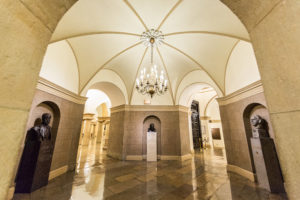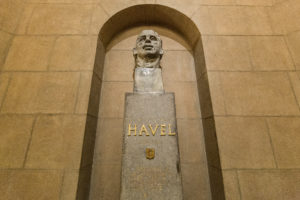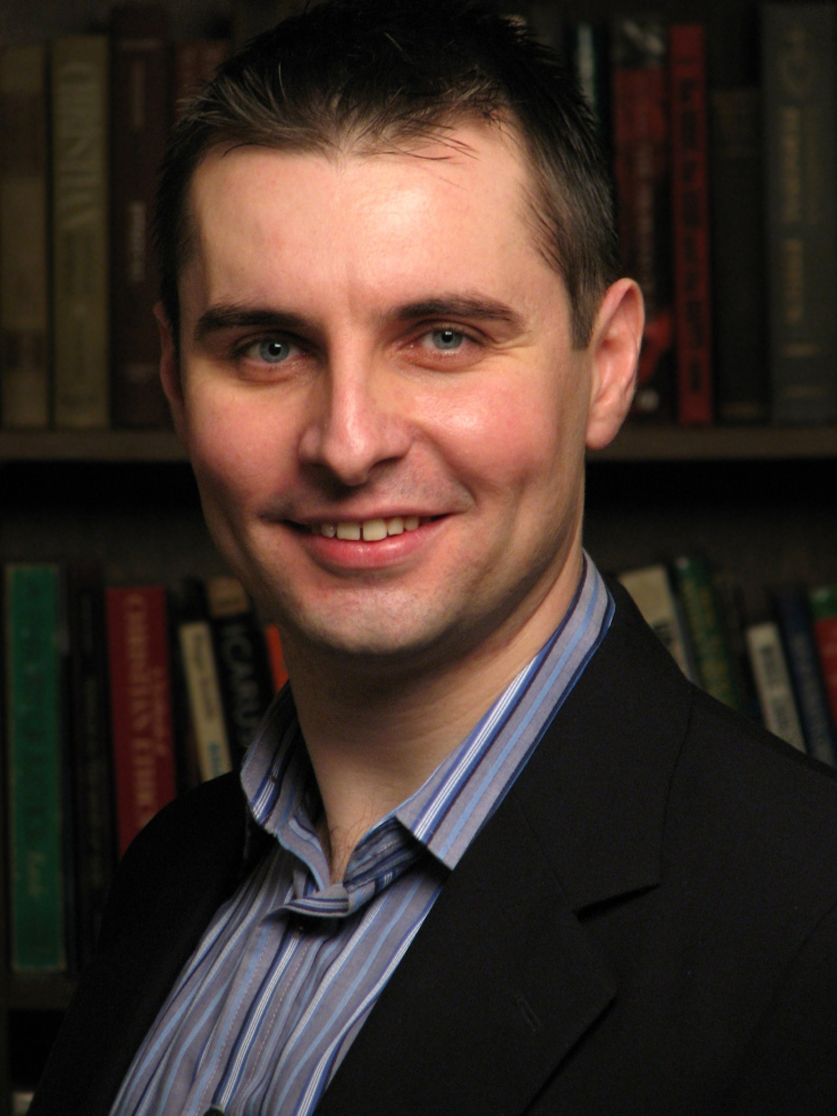As we approach the 80th anniversary of the birth of Václav Havel on October 5, we reflect on the legacy of the man who needs no introduction. In 2014, his bust was unveiled at the U.S. Capitol and can now be found at the Freedom Foyer alongside Winston Churchill and Lajos Kossuth. Some 15 years earlier as the newly elected President of a free Czechoslovakia, Havel delivered a memorable speech to a joint session of the U.S. Congress in the same building. He said:
I often hear the question: how can the United States of America help us today? My reply is as paradoxical as the whole of my life has been. You can help us most of all if you help the Soviet Union on its irreversible but immensely complicated road to democracy. It is far more complicated than the road open to its former European satellites. (…) The more quickly, and the more peacefully the Soviet Union begins to move along the road toward genuine political pluralism, respect for the rights of the nations to their own integrity and to a working—that is, a market economy, the better it will be not just for Czechs and Slovaks but for the whole world.
Although Republican presidential nominee Donald Trump’s words of praise for Russian President Vladimir Putin may make us for a moment believe that Havel’s plea to the United States to support Russia’s democratization no longer needs to be heard, Havel’s words are at least as relevant now as they were when he spoke them. The Soviet Union no longer exists, but Russia, the largest and most powerful of the former 15 Soviet republics, is still struggling on its road to democracy. The Kremlin has created a hostile environment for investigative reporters, foreign NGOs, and religious communities. Putin’s United Russia party dominates the multiparty system at all levels of government.

Internationally, Russian revisionism poses a challenge to the security and stability of Europe, especially post-communist Central and Eastern European (CEE) countries. The Russian government aims to increase its economic influence in the region by keeping CEE heavily dependent on its primary exports: oil and natural gas. The Kremlin seeks political influence through working towards the division of the EU and NATO, whether by funding CEE populist parties who oppose those bodies, paying Internet trolls to post pro-Kremlin rhetoric, or promulgating shoddy journalism that paints Ukraine and Western countries in an immoral light. Recently, Russia has been accused by some U.S. intelligence agencies of hacking the Democratic National Committee and voter databases in Illinois and Arizona to try to influence the outcome of the presidential election. Russia has even militarily attempted to expand its influence in CEE and bolster legitimacy at home, overtly in Georgia in 2008 and covertly in the Donbass region of Ukraine in 2014. Most significant is the country’s internationally condemned annexation of Crimea, a strategic Ukrainian island with access to the Black Sea, in March 2014.
Here we should note that many individuals in CEE are willing to tolerate and sometimes even attempt to justify these practices because of their fundamental distrust or cynicism towards Western democracy. It would be all too easy to dismiss such attitudes as the effect of the residual element of totalitarianism, although such effect nevertheless exists even after over a quarter of century since the removal of the Iron Curtain. The rise of right-wing extremism across Europe should give us pause in assuming the road to democracy is one that always moves forward. Furthermore, if we do not scrutinize our own country’s democratic processes, institutions, and temperaments and strive to improve them, we risk legitimizing those who advocate using authoritarian tactics to craft policy instead.
In 1994, Havel delivered the Jackson H. Ralston Prize lecture at Stanford University, in which he discussed why Western democracy elicits suspicion in many regions of the world. Let us read Havel’s informative and instructive words:
The main source of objections would seem to be what many societies see as the inevitable product or by-product of these [Euro-American] values: moral relativism, materialism, the denial of any kind of spirituality, a proud disdain for everything suprapersonal, a profound crisis of authority and the resulting decay of order, a frenzied consumerism, a lack of solidarity, a selfish cult of material success, the absence of faith in a higher order of things or simply in eternity, an expansionist mentality that holds in contempt everything that in any way resists the dreary standardization and rationalism of technical civilization. People in many parts of the world are of two minds. On the one hand, they long for the prosperity they see in the West; on the other, they reject the importation of Western values and life-styles as the work of the devil.
The prophetic critique—of which Havel himself is a paragon—needs to be a two-way street: when rightly criticizing countries that fail to promote a culture of democracy and human rights, we must also be willing to fairly assess the state of our own democracy and constantly work for its renewal. If we want our message to be credible abroad, we must candidly admit to our domestic failures to live up to the ideals we profess. For example, our country has a long way to go in the areas of maintaining trust between citizens and the police in poor and minority communities and promoting free speech and intellectual diversity among students and especially faculty on college campuses. But let us make no mistake: there is no moral equivalence between Putin’s authoritarian Russia and Western democratic nations. Havel was not an uncritical admirer of the United States, but he was still an admirer. And for good reason. Those fellow citizens who bash the United States without any sense of balance or proportion and measure American progress against an ideal country that never existed do not prophesize in the spirit of Havel.

Václav Havel pleaded the United States to assist Russia on its road to democracy. This is, of course, not a small wish, although it coincides with American interests as well as the interests of our European allies. The country is still the world’s only superpower, but its power is limited. In the final analysis, it will be up to the Russian people to decide between a democratic or autocratic future, but this does not mean that the United States should do nothing. Foreign policy experts have good ideas for helping Russia on its road to democracy, and we should hope the next American president makes this a priority.
But we should also not underestimate that the United States can also help Russia’s democracy as well as the new CEE democracies by strengthening our own democracy through spiritual and moral renewal as well as rediscovering the importance of civic virtue. Gallup’s frequent polling shows that public trust in American institutions of Congress, the criminal justice system, newspapers, television news, and public schools is appallingly low. Americans’ decreasing trust in democracy-promoting institutions, combined with the decline of U.S. civil society, can hamper American democracy itself. The United States is in manyfold ways a “great” country, but it must also be “good” if it wants to maintain or regain its status as the world’s shining city on a hill.
—
Lubomir Martin Ondrasek is the president and co-founder of Acta Sanctorum, a Chicago-based Christian non-profit that works for positive transformation in post-communist Central and Eastern Europe. He holds graduate degrees from Gordon-Conwell Theological Seminary, Harvard University, and the University of Chicago and is presently pursuing his D.Min. in Transformational Leadership at Boston University.
Danni Ondraskova is a junior at Wellesley College majoring in Economics and Russian Area Studies. She is the News Editor for The Wellesley News and recently interned on Capitol Hill.
Photo Credit: President Václav Havel at the European Parliament on November 11, 2009. European Parliament photo by Pietro Naj-Oleari, via Flickr.






